Environmental reasons for NOT spraying with chemicals
People don't realize that the German chemical giant Bayer makes other crop-control products, and NOT just for roses. 94 million acres of corn are planted with seeds treated with pesticides. There's also the Oberon-insecticides spray for corn.
Bayer is the German company that supplied toxic gas during the Holocaust that killed 6 million Jews. The Los Angeles Times on Feb 18, 1999 reported: "In the latest front of Holocaust-related litigation, a federal class-action suit was filed Wednesday on behalf of survivors of Nazi death camps, alleging that Bayer AG, the giant German-owned chemical and pharmaceutical company, participated in cruel medical experiments by the infamous Dr. Josef Mengele.
The suit, filed by a group of lawyers already involved in a spate of other Holocaust-related litigation, alleges that Bayer "monitored and supervised those experiments, and used them as a form of research and development for its corporate benefit."
There's a book about fighting cancer written by an M.D. with a brain tumor. He wrote about growing up in France and watching farmers nearby spraying their corn field.
There are 3 studies that linked bee decline to Bayer Pesticide. If our crops are sprayed, and if our flowers are sprayed, then how will the bees survive?
With the news of Angelia Jolie's double-mastectomy, I was checking on pesticides and cancer risk, and found a large study of 30,454 farmers' wives in Iowa and North Carolina, and here's the study's conclusion:
"The authors found no clear association of breast cancer risk with farm size or washing of clothes worn during pesticide application, but risk was modestly elevated among women whose homes were closest to areas of pesticide application." See link below for the study:
In my last house of acidic clay, only 1/2 hour away, I mulched with acidic pine bark, I also sprayed regularly with Bayer, and had the worst blackspots both in fall, and also in the spring (I winterized with acidic wet leaves, which didn't help).
Now in the new house with alkaline clay, pH 7.7, have 55+ own-root roses, no spray, less diseases, when I keep the surface dry and alkaline. Here's own-root Evelyn rose, 2nd year in spring:
Here is a link that might be useful: Pesticide Use and Breast Cancer risk
This post was edited by Strawberryhill on Sun, Sep 15, 13 at 12:11
Comments (58)
strawchicago z5
Original Author10 years agolast modified: 9 years agoThank you, Kitty, for info. about scents. I don't have Enchanted Evening. I have Angel Face, very healthy here. Love Potion is on my wish-list, it's low-thorn, right?
Kitty, I'm happy that your roses have great fall flush! My roses bloom more when I put gypsum into my pH 8 tap water, rather than vinegar. I find that vinegar (acetic acid) really hurt plants, but useful in killing weeds.
Gypsum benefits plants more so than adding citric acid (for sprouting), or used lemons. I see immediate green-up, less rust, and more blooms with gypsum in my rock-hard alkaline clay. My clay is tested super-high in magnesium .. magnesium is what makes clay sticky. Magnesium also binds up with phosphorus, making it less available. I get better result with organic phosphorus than chemicals.
I did an experiment: I put my pH 8 tap water and sticky clay in a bottle. Then I added molasses (with trace elements & calcium & potassium). Then I added potassium sulfate NPK 0-0-50. It heated up, then solidified into concrete.
I added gypsum (calcium sulfate). Wait for a few hours, it changed from solid into liquid. Gypsum is used to release nutrients-tie-up from the hydrated lime added to tap water. It breaks up my clay really well. The $6.99 per 40 lbs. bag of gypsum from the feed store are tiny pellets, and dissolve well in my hard water.
seaweed0212
10 years agolast modified: 9 years agoRelated Professionals
Fort Lee Landscape Architects & Landscape Designers · Glendora Landscape Architects & Landscape Designers · Seabrook Landscape Architects & Landscape Designers · Wakefield Landscape Contractors · Anderson Landscape Contractors · Centereach Landscape Contractors · Cincinnati Landscape Contractors · Los Banos Landscape Contractors · Methuen Landscape Contractors · Middle River Landscape Contractors · Monterey Landscape Contractors · Porterville Landscape Contractors · Severna Park Landscape Contractors · Thonotosassa Landscape Contractors · Weslaco Landscape Contractorsstrawchicago z5
Original Author10 years agolast modified: 9 years agoThank you, seaweed, for that pic. of Deja Blu rose. I look it up: very fragrant, semi-thornless, 2' to 3' tall miniflora, sold at Chamblee nursery in Texas for $9.95 per gallon.
I got 4 roses in gallons from Chamblee in Texas, solid root ball, came with blooms. That nursery sends the heaviest roots that are worth the shipping cost.
seaweed0212
10 years agolast modified: 9 years agosame time from Sprout market I got another mini flora, the name, Ambiance, $4.99 each. I am very pleased with both. They were so many of these two on sales during March. I knew both back in 2011, thought too delicate for me. They are under full sun, 5gal pot, Deja Blu has the same pink colour, but Ambiance lately lost its pale yellow tone, center is apricot colour and white on the edge, summer heat has bleached the colour. The photo was the first bloom back in May. I shall move them back to the patio, not direct sun.
\
strawchicago z5
Original Author10 years agolast modified: 9 years agoThank you, Seaweed, for that lovely shot of Ambience rose. I have a few apricot roses: Summer Samba, Samaritan rose, Crown Princess Magareta, Versigny, Pat Austin ... they have better color in partial shade.
Below is Versigny rose, very disease-resistant. The bloom has a heavenly fruity scent, it's the best scent among my peachy roses.

strawchicago z5
Original Author10 years agolast modified: 9 years agoI found a May 13, 2013 article, see excerpts from the below link: "New research published in the Journal Neurology further supports the link between pesticide exposure and Parkinson’s disease.
Emanuel Cereda, M.D., Ph.D., of the IRCCS University Hospital San Matteo Foundation in Pavia, Italy, and coauthor Gianni Pezzoli, M.D., analyzed 104 studies published between 1975 and 2011 to determine the link between pesticides and solvents to Parkinson’s disease.
Researchers found exposure to pesticides increased the risk of developing the disease by 33 percent to 80 percent. Some pesticides were considered to be of higher risk than others, with weed killers like paraquat and FUNGICIDES MANEB AND MANCOZEB causing twice the risk for development of Parkinson’s disease.
Another recent publication found that rural residents who drank contaminated well water had an increased risk��"up to 90 percent��"of developing Parkinson’s.
People with Parkinson’s have a variety of symptoms including loss of muscle control, trembling and lack of coordination. They may also experience anxiety, constipation, dementia, depression, urinary difficulties and sleep disturbances.
At least 1 million Americans have Parkinson’s and about 50,000 new cases are diagnosed each year. With less than one percent of cases caused by genetics, researchers have been looking for the potential risk factors for developing Parkinson’s disease."
Here is a link that might be useful: Pesticides and Parkinson Disease
This post was edited by Strawberryhill on Tue, Nov 5, 13 at 18:03
strawchicago z5
Original Author10 years agolast modified: 9 years agoColorado rosarian Stan composed an excellent list of chemicals toxic to bees. See link below:
Here is a link that might be useful: Bee-careful-what-you-spray by Stan
stan_the_roseman
10 years agolast modified: 9 years agoHi folks! I have not been here to Garden Web is some time. I was contacted my Strawberryhill and decided to come back as time permits to catch up. Great thread here folks!
strawchicago z5
Original Author10 years agolast modified: 9 years agoHi Stan: Thanks for stopping by. Your blog has excellent info. for rose-growers, much appreciated.
Bayer, the maker of many chemicals for roses, is among the top offenders of corporate crimes, compiled by "Corporate Watch Research.com", here's some excerpts from link below:
"Bayer, IG Farben and World War II: Slave Labour and Deadly Gas
Bayer (along with BASF and Hoechst) was an original member of the IG Farben group. During WWII, IG Farben built a synthetic rubber and oil plant complex called Monowitz close to the Auschwitz concentration camp. Inmates worked as slave labour for IG Farben,[216] and when they were too weak to work they were killed in the gas chambers. ""Bayer, IG Farben and Human Experiments[222]
IG Farben also conducted experiments on humans. Eva Mozes Kor, among the 1,500 sets of twins experimented on by the infamous Dr. Josef Mengele.""Medicaid Scam[233]
The American unit of Bayer AG agreed to pay $14 million to settle charges of causing inflated Medicaid claims after defrauding the government by setting prices that were too high on drugs such as Kogenate and Koate-HP, used to treat haemophilia and Gamimmune, used to treat immune deficiency diseases"Bayer donates over $500,000 a year to the American Heart Association (AHA), which may explain why the AHA has endorsed only Bayer aspirin.
PCB [255]
Bayer also produced polychlorinated biphenyls, or PCBs, under the trade name 'Clophen.' During the 1970s, the health risks associated with PCBs (including skin ailments, reproductive disorders and liver disease) became a major consideration due to several well-publicised incidents.... See link below for other illegal toxic chemical dumps that Bayer did."
Here is a link that might be useful: Bayer war crimes, scams, bullying, and poisons
This post was edited by Strawberryhill on Tue, Jan 14, 14 at 14:29
TNY78
10 years agolast modified: 9 years agoHey Strawberry, I got your email the other day, but Gardenweb isn't letting me respond to it for whatever reason. Anyway, I know I haven't been on here alot recently. We've been building a new house, so I've been more focused on propogating roses I want to take with me, than adding new ones or photographing my existing ones. I'll be sure to post some feedback in the next couple of days regarding my experience with acidic red clay. Happy to hear your Blue Mist is doing well!
Tammy
(by the way: completely see what you're saying about one person inparticular!)strawchicago z5
Original Author10 years agolast modified: 9 years agoHi Tammy: Good luck on your new house .. we had our house built 14 years ago and it was so much fun picking out the design, the carpet, the fireplace, etc..
Moyesii is a big organic-rose grower in New York. She posted many great pics. in HMF, rather than Roses forum, citing dislike for "corporate sleuths" who push for chemicals. I agree, Bayer defends its profit with many lies, see an excerpt from link below:
"Is Big Business Killing the Largest Labor Force on the Planet? The majority of the pesticides held responsible for the bee demise are produced by none other than Bayer Company. The toxic pesticides pulled by Germany are largely manufactured by Bayer. But Germany is not the first to make such a move. Back in 1999, France banned the use of imidacloprid, and rejected an application from Bayer for clothianidin this year. For Bayer, imidacloprid and clothianidin account for $1.25 billion in global annual sales.
Many hives were found in Florida recently to contain high levels of imidacloprid. A patented chemical, it is manufactured by Bayer. Out out of those 14 hives only one survived ... If you use Advantage on your cat or dog it is in your home already.
The most widely used applications for imidacloprid in California are pest control in structures, turf pest control, grape, lettuce, corn, fruits, cotton, etc.
In the case of bees, the imidacloprid apparently does not directly kill the hives, but disorients the bees and causes them to disband ... That's why, when Colony Collapse Disorder is the problem, no dead bees can be found near the hive. "
From Straw: In my 20 years of frequent visits to nearby Cantigny rose park (1,200 roses) ... I never see a butterfly, and saw a bee only one time. They spray their roses frequently with Bayer.
My neighbor has a 10 years old Angel Face rose, and hers is clean (no spray), despite Angel Face reputation for BS. Our soil is dolomitic-limestone clay, pH 7.7, with 40" of annual rain, and 36" of snow. Below is a picture of own-root Angel Face rose in my garden, no spray, and clean.
Here is a link that might be useful: Beecharmers on Bayer Corp.
This post was edited by Strawberryhill on Tue, Jan 14, 14 at 14:46
view1ny NY 6-7
9 years agolast modified: 9 years agoStrawberryhill, I wanted to thank you for your original post. I read it awhile ago and can't get it out of my head. My parents are both Holocaust survivors (my father survived Auschwitz.) My mother (14 years old at the time) told me how she saw Mengele separate inmates either to the left or the right. One line of people were kept as slave labor and the other line sent to the gas chamber. The thought of using a spray made by Bayer makes me ill. I had no idea.
I'll live with blackspot. It's fine; the leaves look ugly but the roses bloom on.
strawchicago z5
Original Author9 years agolast modified: 9 years agoThank you, view1ny, you made my day. I posted the same "Bayer is the German company that supplied toxic gas during the Holocaust that killed 6 million Jews ... " I posted that in regular Rose Forum, and got attacked by corporate sleuths & sprayers. They have to win at any cost, be it defaming others, or be environmentally irresponsible.
Thank you, view1ny, for sharing your personal Holocaust tragedy. I feel the same, after living in Connecticut & was helped by the most wonderful Jewish friends. I'm impressed with the Jews' non-racist, compassionate, and giving nature. From that time on, I read at least a dozen books on Holocaust tragedies.
Black spots are not ugly compared to what Bayer did. The more we depart from nature, the more chance of black spots. My 1st rose garden in partial shade, rarely watered with tap water, mulched with mushroom compost (pH over 8, with beneficial bacteria to suppress fungi) ... none have black spots, even Golden Celebration in its 3rd year.
My 2nd rose garden in full sun, frequently watered with my pH 8 tap water (has hydrated lime, or calcium hydroxide, which is unstable and binds with potassium & trace elements) .. that has some black spots.
My 3rd rose garden, where I experiment with chemicals, from mulching with cocoa mulch (pH 5.8), to dumping gypsum (17% sulfur), to dumping alfalfa meal (slightly acidic), to high-salt & nitrogen & acidic fertilizer ... these roses came down with fungal diseases: mildew, black spots, and rust.
My major is computer science, minor in chemistry. The more experiments I do with roses, the more I'm convinced that by selecting the right roses for one's soil & climate, and with natural means (compost & manure) pave the best route for healthy roses.
This post was edited by Strawberryhill on Tue, May 13, 14 at 12:57
view1ny NY 6-7
9 years agolast modified: 9 years agoStrawberry, I'm so sorry that you had that experience in the other Roses forum. I did a search but couldn't find the thread. I assumed that you used the same title as in this forum, but my search came up empty. Do you know how I can find it?
What type of water did you use in your 1st rose garden? Here in Brooklyn, all that's available is nyc tap water. Is there anything I can add to it to prevent blackspot?
Thanks for any info.
view1ny NY 6-7
9 years agolast modified: 9 years agostrawberryhill, you mentioned using mushroom compost in your 1st garden, which I can try to find locally. What I meant in my question in my last post was: since I have to use the tap water at my disposal, is there anything else I can add to the water?
strawchicago z5
Original Author9 years agolast modified: 9 years agoHi view1ny: The offensive thread where M. ridiculed me over my report on Bayer was deleted by Gardenweb. They also deleted 2 other offensive threads with M. against me, calling me a Troll, and a "fictitious character".
MichaelG. had been active in forums, promoting Bayer frequently for the past decade. But he's absent since end of Jan., with Gardenweb's deletion of his many offensive remarks. But there's still one evidence left of his milder put-down against me, see below link. In that thread I wasted my time posting picture of Annie L. Dowell rose to help Diane (Fogrose), just to be shot down by MichaelG.
Most tap water have calcium hydroxide added to prevent corrosion of pipes. I tested the pH of bottled "mineral-water", and it came out to be 7.3, using fish-tank litmus paper. My well water is hard-water, pH over 8, with whitish calcium deposits on pots. pH of rain water is 5.6.
Calcium hydroxide in tap water is DIFFERENT from garden lime, calcium carbonate, which is stable and stay-put-where applied. Calcium hydroxide is unstable & reactive and it binds with potassium, phosphorus, and trace elements in soil, making them less available to plants.
Potassium and trace elements are essential in disease prevention. Sulfate of Potash is a natural mineral, high in potassium NPK 0-0-50, with 21% sulfur to balance out the high pH of tap water. The recommended rate is 1 teaspoon per 2-gallon of tap water. It's sold as potassium sulfate at Kelp4Less for $8 per lb., free shipping, and dissolve easily in water.
I tested that on my roses last fall, with leaves became dark-green & shiny, and explosion of buds. I got lazy in mixing with water, so I spread a tiny bit of sulfate of potash powder over my soil, and water that in. It dissolved easily.
People spread alfalfa pellets with NPK 2-1-2 around rose bush, but when I called my feed-store, the guy told me, "don't feed that stuff to your rabbits, because it's high in sugar". I don't have rabbits, but the high-sugar-content alarmed me. I took microbiology in college, we promoted fungal growth by adding sugar to the medium.
A better choice: Alaska dry fish fertilizer at Menards or Home Depot at $7 for a 3 lb. bag, with NPK 4-6-6, for tomato & veggies. It has alfalfa meal, fish meal, cottonseed meal, and kelp meal. The potassium content is 6, same as phosphorus, and decent trace minerals from kelp. Those pellets are big, so they break down slowly, rather than all at once, thus less chance of burning.
After applying organic fertilizer, I would spread on top a layer of alkaline compost: Mushroom compost is the most expensive, at $5 a bag, high pH 8 to 10. Humus & manure works just as well, $1.59 a bag, pH around 8. And last is bagged top soil, at $1.29 a bag, pH and composition varies with regions on the country. Since my area is alkaline clay, the bagged top soil is sticky & alkaline clay. But some areas of the country, like NC and SC, the pH of bagged top soil is acidic around 4.5. And Florida bagged top soil is mostly sand.
This past fall, the week before Thanksgiving, zone 5a, I spread chicken manure first, then cover with bagged Humus & Manure sold at Home Depot. I'm very please with the spring growth on my 55+ roses .... zero black spots in our recent 3-days of rain, including the BS prone such as Comte de Chambord, and Paul Neyron. I don't even bother dusting my roses with corn meal.
In hot summer, I would NOT use chickity-doo-doo manure, 25 lbs. for $8.99, with NPK 5-3-2.5 ... for the reason that it's higher nitrogen (at 5), low in potassium (at 2.5). Plus it's higher in salt & faster release. Chicken manure is more appropriate for spring, or late fall, with plenty of rain & cool weather.
Here is a link that might be useful: Shot-down by M. in
This post was edited by Strawberryhill on Wed, May 14, 14 at 13:09
view1ny NY 6-7
9 years agolast modified: 9 years agoStrawberryhill, thanks for the link & all that info. wow. you gave me lots to think about.
Hang in there.
dreamgarden
9 years agolast modified: 9 years agoGreat post. Especially about the Bayer company. Hard to believe they got away with their abuse of the Nuremburg code all the while riding the fence.....
I bought a Oklahoma rose that is still in the bag. I'd like to use natural pesticides as I don't want to hurt the bees or butterflies that will be visiting the blooms.
Any opinions about using Neem oil?
strawchicago z5
Original Author9 years agolast modified: 9 years agoHi Dreamgarden: Thank you, I'm glad you feel the same way toward Bayer corp. I don't have experience using Neem oil, so I checked on someone else who successfully used Neem oil, see below posts
•Posted by jjstatz29 5 (My Page) on Tue, Mar 25, 14
I hope I don't cause a war with this... but
I use neem to control fungal diseases. It's important to note though, I use pure cold pressed neem and not a distillate product or the laughable serenade. I use it blended with a sticker/carrier (fish hydrolysate) and an emulsifier (a dash of biodegradable dish soap - otherwise the oil is just going to sit on top like un-whisked salad dressing) and I apply it weekly to bi-weekly.•Posted by nastarana 5a (My Page) on Tue, Mar 25, 14
What is your source for cold-pressed neem?
A few years back, a British poster on another garden forum claimed success in deterring fungal diseases by adding neem cake (that is the residue from neem seeds after the oil has been pressed out) to his fertilizers.•Posted by jjstatz29 5 (My Page) on Wed, Mar 26, 14
I use neem oil from Ahimsa alternative - http://www.neemresource.com/
I buy my fish/seaweed hydrolysate from neptune's harvest
http://www.neptunesharvest.com/fs-191.htmlor I buy from brown's for just straight fish hydrolysate
http://brownsfishfertilizer.com/products-page/When you plan on spraying - take the bottle out, put it in a sink of hot water until it returns to liquid state. I usually pour the portion I need (.5 fl oz per gallon - a tablespoon) into a bucket and then return the bottle to the fridge, add my 1 ounce (1/8th cup per gallon of water) fish hydrolysate (be sure to thoroughly shake the container before measuring it out - be warned - this stuff is smelly), and scant tablespoon of biodegradable soap - I get 7th generation - it's cheap & readily available.
Then I add about half the water I need and stir it several times in one direction and then switch directions with a dedicated whisk. Pour into sprayer add remaining amount of water needed, close your sprayer, shake thoroughly and start spraying (make sure their are no oil droplets at the top of the solution - neem has to be thoroughly mixed to be effective - think like salad dressing - who likes separated salad dressing? yuck.
I prefer spraying right before sundown or even at night (with a flashlight... my neighbors naturally think I'm nuts) and to the point of runoff. Be sure to get undersides of leaves.
Few other pieces of advice - this stuff is smelly. Neem has a very strong garlic-nutty smell and fish hydrolysate... well it smells like rotten fish (trust me the cold process hydrolysate smells A WHOLE lot better than the cheaper, less effective hot processed stuff... ugh). Be assured it dissipates quickly.
DO NOT spray on host plants for butterflies/native endagered insects - Azadirachtin (the main active compound in Neem) interrupts the molting process of insects that consume it. Butterfly caterpillars, that eat and live on their respective host plants that are treated with neem (or any other spray for that matter) will die. Hope that answers some questions. Jordan - Organic/Holistic Orchardist and Gardener
•Posted by jjstatz29 5 (My Page) on Thu, Mar 27, 14
Michaelg - There doesn't seem to be any research on azadirachtin and blackspot. Well, that's because azadirachtin (the primary active compound in neem oil) isn't the anti-fungal agent working within neem oil.
Neem works as a fungicide by
1. Coating as an oil like any oil coating spray and boosting cuticle defense on the leaf surface - this can also be boosted by applying fermented compost tea of horsetail/nettles which boost silica content in leaves.
2. Secondary plant metabolites stimulate an immune response from the plants neem oil is applied to.
3. by repelling insects that spread and open wounds for disease entry
4. The fatty acids in liquid fish and neem fuel the beneficial fungal/bacterial presence that out competes the harmful types.
Jordan - Organic/Holistic Orchardist and Gardener
Here is a link that might be useful: Thread in rose forum,
This post was edited by Strawberryhill on Fri, May 30, 14 at 10:09
KnoxRose z7
9 years agolast modified: 9 years agoStrawberryhill,
I wish I could give you a high five through my computer screen for posting this. I am new to growing roses but I am not new to arguing with people who are pro-gmo and pro chem-agriculture. It is amazing what chemical corporations do to us everyday without our knowledge or consent, and the saddest thing is that most of the time if you try to stand up and say "this is not ok" you are deemed "a hippie wackjob". The people of the the world & especially the US need to be aware of what is going on right outside their doors, and right inside their refrigerators.
Thank you for doing more than your share to make people aware.
Also, thank you for just being an amazing gardener and an amazing teacher, I have admired your knowledge of all things garden several times on many many other topics & posts on this forum, I've taken advice you have given to countless others & I am so thankful to have you and all of the other knowledgable posters to guide me with my new hobby (obsession) of gardening.. I thought you were cool before, & then to get on here and see this too.. I just wish I could shake your hand. Thank you for being a member of this forum.Jessica
strawchicago z5
Original Author9 years agolast modified: 9 years agoHi Jessica: Thank you for your kind words, which make-up for what I went through in other forums dominated by sprayers. There's a saying, "One group would reject you, but another group would welcome you." I appreciate your taking the time to heal my past hurt, it helps tremendously.
The rose community has been dominated by oldies, such as ARS with its recommendations of: mulch with acidic pine bark, spray with Bayer, and fertilize with chemicals. I wonder how many corporate sleuths are inside American Rose Society?
Our health community is also dominated by corporate-backed, now-proven-wrong: hormone replacement therapy, and chemicals & drugs for every illness. I wasted over $1,000 on desensitization shots for my allergies, plus $$$ on hay fever pills ... the side-effects were not worth, plus I still have hay fever. What helped recently is taking probiotics.
The below document by World-Health-organization explains how probiotics act. L. Rhamnosus helped with allergies, and L. Rhamnosus GG is also documented as effective for weight loss, see link: http://www.ncbi.nlm.nih.gov/pubmed/24299712
""Lactobacillus rhamnosus CGMCC1.3724 (LPR) supplementation on weight loss and maintenance in obese men and women over 24 weeks. In a double-blind, placebo-controlled, randomised trial ... LPR-induced weight loss in women was associated not only with significant reductions in fat mass and circulating leptin concentrations but also with the relative abundance of bacteria of the Lachnospiraceae family in faeces. The present study shows that the Lactobacillus rhamnosus CGMCC1.3724 formulation helps obese women to achieve sustainable weight loss."
The VSL #3 DS-formula (DS means double strength) is prescribed by doctors, for IBS and ulcer. VSL #3 with 8 strains of bacteria is about $50, but NOW probiotics with 10 strains of bacteria is only $15, free shipping on Amazon.
NOW is what I'm taking, it helps me to be regular & reduced my allergies. There are a few studies that substantiate the use of probiotics for acne. It lessened my kid's facial pimples, she's going to be 12 this fall.
Here is a link that might be useful: World Health Organization on probioties
Zyperiris
9 years agolast modified: 9 years agoOMG..Nazi link to Bayer. Who knew? Let me tell you every time I think of spraying my roses I feel like a Nazi..what am I going to kill. I don't know a whole lot..but let me say..we had a raised planter with pine trees in it. in 2008 I had my husband dig those out and I started my rose garden. I am in the zoggy PNW. From what I could tell our soil is sandy. I added Gypsum..and different kinds of compost over the years and refused to spay. I tried Neem oil from time to time..but it doesn't seem to work for me. I neglected my rose garden last year..but my depression has lifted and I am back..let me tell you..I have a little BS..but not much. I have a variety of bugs that show up and it's fun trying to figure out what they are. When I use chemical sprays like Miracle Grow it forces growth and in my opinion weakens the roots and encourages BS. Do I have scientific facts..NO..... I just know from watching my garden. Embracing all of Gods creatures is so..well ZEN..and higer power and all that. Get a good disease resistant rose and good soil and embrace the non spaying deal. You will be happy watching the bees do their work.
strawchicago z5
Original Author9 years agolast modified: 9 years agoHi Zyperisis: Welcome back! I'm glad you feel better. Thank you, you said it better than I could. I visited the Cooking Forum briefly and posted on the dangers of GM (genetically modified) corn and soy. There was this woman who kept on giving me a hard time, then she admitted that she's on a medication that has psychotic effects. The retired professor of chemistry, Dr. Henry Kuska, was the one who backed me up in that GM thread.
For every chemical used, be in the garden or in the body, there's a side effect. Examples: anti-depressant drugs and their psychotic effects:
"Eric Harris who was one of the Columbine High School shooters in 1999. Harris was taking antidepressants at the time of the shootings. Other children, too, have committed violent crimes while taking these drugs. These include:
•Kip Kinkel, 15, who killed his parents and two classmates and wounded 22 others while on Prozac.
•Elizabeth Bush, 14, who wounded a classmate at Bishop Neumann High School in Williamsport, Pa. while taking antidepressants.
•Jason Hoffman, 18, who wounded a teacher and three students at Granite Hills High School in El Cajon, Calif. while taking Effexor and Celexa.
Shooter Eric Harris was taking the antidepressant Luvox at the time he and Dylan Klebold opened fire at Columbine High School, killing 12 students and a teacher and wounding 26 others before killing themselves. At least one public report exists of a friend of Klebold who witnessed Klebold taking the antidepressants Paxil and Zoloft and urged him to come off them."
*** From Straw: I agree with you, Zyperiris. Balance in nature is what promotes health. When we upset that balance in nature, illness occur. Then we fix what's broken by chemicals, furthering upsetting the balance. See below think on dangers of GM (genetically modified) food, why mess up nature to further a corporation's profit?
Here is a link that might be useful: List of GMO free foods in cooking forum
This post was edited by Strawberryhill on Thu, May 29, 14 at 10:14
Zyperiris
9 years agolast modified: 9 years agoI take a antidepressant..and I have since 94. BUT..I agree with you. I purchased some Dr Earth Rose Food today. It has Cottonseed meal, Fish bone meal, Fish meal, Alfalfa Meal, Kelp Meal. I SWEAR on my life my roses look so much better without synthetics. The plants look healthier. I will post photos as soon as I am done cleaning it all up..It has taken several years of just gritting my teeth and not spraying. I just read that synthetics force growth and insects arrive. How unreal that I discovered that for myself. I soooo remember my year where I was heavy into Miracle Grow and my roses were growing sure enough..but flopping over and covered in BS and Aphids and all kinds of critters. NUTURE the soil and the roses will grow..but you can't be looking for immediate gratification it takes awhile. I am so convinced and so happy with my decision. If would use Miracle Grow again..but ONLY if I was having a giant party in my yard and wanted my roses to look spectacular..it would make them bloom but I would pay a price for it..What I will do now is use up my Miracle Grow on my planters of annuals. Anyone reading this please listen.
strawchicago z5
Original Author9 years agolast modified: 9 years agoHi zyperiris: I have the same experience like what you wrote: " I SWEAR on my life my roses look so much better without synthetics. The plants look healthier. I just read that synthetics force growth and insects arrive." That's so true!
From Straw: I would love to see pics. of your garden, Zyperiris (thank you in advance). In your rainy PNW, I'm sure roses are more vibrant than my alkaline clay & hard-water. What you wrote on chemicals attract insects is so true. That's why I do late-fall fertilization with chicken manure, but skip the spring fertilization.
Seaweed in CA grows 160+ roses with no chemicals, only fish emulsion and chicken manure, she has low rainfall of 11" per year with alkaline soil, but her roses has this intense vibrant color from organics, see her Sweetness rose below:
This post was edited by Strawberryhill on Fri, May 30, 14 at 10:13
seaweed0212
9 years agolast modified: 9 years agoTo dear Strawberryhill:
Thanks for doing the work with me and for me since I have a slow old laptop! No problem when I download email, only on thread of gardenweb.com, love your Angel Face, vigorous, healthy and lovely as well, we are so lucky to have a sneak peek of what heaven is.bart_2010
9 years agolast modified: 9 years agoStrawberryhill, I think you should post this on the regular rose forum too, maybe change the title to something like "Bayer linked with holocaust crimes",and then just don't check back to read the reactions. I think this is too important a piece of information to be ignored,and though there are some very irksome people around, there are plenty of others who have open minds. Plus, many of us on the "regular" rose forum are no-sprayers ...or, like myself, going no-spray,a decision I made in part due to a thread on the regular rose forum (and in part due to the fact that my garden is getting too big!) But people who are still buying Bayer products should be made aware of this information. Even if they intend to continue spraying and are against organic gardening, hopefully in reading this post they will be persuaded to look for non-Bayer products.
I'll try to start visiting this forum more often myself; I mainly go on the "regular" rose forum because of some of the knowledgeable warm-climate posters. If I'm not mistaken, Kim Rupert is a no-sprayer. Also, Paul Zimmerman,whom I hold in high regard,wrote that he only sprays if a rose is suffering from a life-threatening disease like downy mildew or something.So that's at least two leading rosarians who are against spraying... You should check out Paul's forum; it's great; he's got the Bierkreek people (an all-organic rose nursery in the Netherlands) monitoring the "Sustainable Gardening" section. At Bierkreek, they advocate not spraying ANYTHING AT ALL (not even Neem oil, I gather!) because of the risk of killing off the good guys: the good fungi and insects! I'm planning to try this, since it's the easiest. In any case, information like this should be made well known all around,and I doubt anybody on PZ'S forum will "shoot you down" for your interest in organic gardening...quite the contrary!!!! ...regards, bart P.S. in the future, when I buy aspirin,I will ask if the pharmacy carries a non-Bayer brand....strawchicago z5
Original Author9 years agolast modified: 9 years agoHi Bart: It's good to hear from you .. how's your Italian rose garden doing? Did you tame your Huntington rose's octopussy canes? Thank you for encouraging me to speak the truth ... and not be afraid of negative folks.
I'll check out Paul Zimmerman forum ... I like all the info. he gave. Feel free to pass on this thread to others ... in whatever forum you visit.
I love your approach of buying things which support the environment. Thanks again for dropping by with your support. Also I glanced at Antique Rose Forum and saw your thread on solving chlorosis problem.
Check out how I greened up my very pale tomato plant in the thread below: Forget to mention that I soaked organic pellets, PLUS soluble gypsum to green up that tomato:
Here is a link that might be useful: How to green-up chlorosis fast
bart_2010
9 years agolast modified: 9 years agoMy garden gave me a breath-taking, long spring flush this year, Strawberryhill.In spite of a lot of blackspot,it was a glorious two months-now, alas, truncated by the heat wave. I'm hoping in time to clear up the b-spot problem in my garden.I'm seriously grateful to Paul Zimmerman and Bierkreek for the help they gave with my beetle problem; my roses look so much better since I stopped spraying against insects! so hopefully the b-spot issue will be solved as well . I think I saw on this forum about the theory that acid mulch incourages b-spot. Sadly, that is the only kind I've found ,where a neighbour cut down a pine grove; still,I think my poor garden will be so glad for any kind of organic matter it can get,so we'll just wait and see about that. In any case, I think improving the soil is just too essential in my case for me to be too picky.
My Austins were all GLORIOUS this year! maybe due to all the rain we got, but also I did work a lot on the soil. I think your advice about holding off on the nitrogen was a big help for my Austins. The Ingenious Mr. Fairchild was restored to it's former beauty this year!!!!, James Galway was fantastic, ditto Young Lycidas... regards, bartjim1961 / Central Pennsylvania / Zone 6
9 years agolast modified: 9 years agoHi all, hope I can hang out here at times. We have very high blackspot pressure here but I still do not spray fungicides.
We have pets in the backyard that like to lay under the rose bushes so do not want to spray them with chemicals. Not to mention the grandchildren running around when they visit. So I've been slowly locating disease resistant roses for my area without the need to spray.Just planted this Thomas Affleck Rose out front. Hoping it does well here.
First bloom on Thomas Affleck:
strawchicago z5
Original Author9 years agolast modified: 9 years agoHi Jim: it's good to hear from you ... Serena in KS like your organic ways, so do I. Your dog is so cute .. I can see a cute cat in the background. Your garden is clean & neat.
I have been admiring Thomas Affleck rose for a long time .. such disease-resistant ... plus thornless to. I have its parent, Basye's Blueberry. BB is thornless & disease-resistant, and has its intense wild rose scent. But BB is not as pretty of a bush as Thomas Affleck. I like BB's flowers, but the foliage is coarse & weed ... picture below is Basye's Blueberry rose, with Angel Face lowest left:
jim1961 / Central Pennsylvania / Zone 6
9 years agolast modified: 9 years agoI like how BB yellow stamens stand out! Very nice bloom Strawberryhill!
Our Thomas Affleck has some thorns so I call it near thornless...lol
I still communicate with Serena via email or FB...jjstatz
9 years agolast modified: 9 years agoGlad to see this still going strong. Thanks Strawberry for including my neem spray advice!
gardenbear1
9 years agolast modified: 9 years agostrawchicago z5
Original Author9 years agolast modified: 9 years agoHi Gardenbear: I LOVE YOUR DOG ... she's so cute. Chihuahua are so friendly ... my neighbor has two that she walks with them everyday. Seeing those tiny dogs walking the entire block motivated me to get some exercise too !!
Thank you for posting Fern in this forum. Fern is adorable and made my day.
jim1961 / Central Pennsylvania / Zone 6
9 years agolast modified: 9 years agoThat's great reasons gardenbear! Love the dog pic! :)
gardenbear1
9 years agolast modified: 9 years agoI wouldn't call her small she tops out at 20 lb, we walk 6 blocks every day rain or snow won't stop her, if its windy she won't go out side at all. I worry that she might get her nose into a plant thats been sprayed with chemicals so I make sure what every I use is safe around her.
Straw, I talk to a friend of mine that grow Cannabis and he said that Bayer was the worst stuff to use on any thing that grows and that its not really safe to use around people, so he won't even allow it any where near this growing area.Bear
seaweed0212
9 years agolast modified: 9 years agoseaweed0212
9 years agolast modified: 9 years agoThanks again for posting the pure bred 2 years old Mocha, he is our beloved visiting guest pet from time to time, he has that charming facial expression, enough to melt your heart! He comes from east coast breeder air shipped, had to go thru inspection at airport in his young age of few months old, he is such a good companion, enjoying running around among my rose bushes, did not get hurt by the thorns, amazing! No chemicals allowed in my yards! We do have 3 chicks helping organic fertilizers for free!!
jim1961 / Central Pennsylvania / Zone 6
9 years agolast modified: 9 years agoVery nice pics of your daughters dog Seaweed!
Cute! Pets can be like our children!Our two cats love to eat grass in the yard so does our dog at times. Cats lay under some of the rose bushes amazing they never got thorned yet...
They all tug on plant stems/foilage once in awhile too...lolThis post was edited by jim1961 on Mon, Jul 7, 14 at 20:20
enchantedrose
9 years agolast modified: 9 years agoGreat posts all. These chemicals are so dangerous and so many are so unaware or couldn't care less. Years ago my aunt's cat was diagnosed with sclerosis of the liver disease. She jokingly stated that her cat didn't drink. Her veterinarian asked if the cat went outdoors and told her that the disease probably developed due to exposure to her neighbors lawn that was treated by ChemLawn. My husband works for the utility company. They sprayed Roundup several years ago to kill some weeds at one of their job sights. NOTHING has grown there since. We use no chemicals in our yard but have very few honey bees although we do have lots of bumblebees. My crab apple tree had plenty of spring blossoms but has virtually no fruit due to lack of honeybees. We have no lawn, just flower beds and gravel paths on about 1/4 acre of our 1 acre lot. The rest is woods. I don't know if the lack of bees is due to our being in such a wooded environment or if there is something else going on. We have plenty of dragonflies and butterflies so it may be that honeybees like a more open area rather than dense woods.
I bought Bayer 3 in 1 once and never used it when I reasoned that there was no way for the pesticide to distinguish the good bugs from the bad. I now deal with the insect damage if not too severe and try to manually kill the damaging insects when they start to overwhelm the plants. When you look at the seeming explosion of cancers in our generations, 1959, and later it's difficult to not question whether this is due to the fact that we are poisoning our food with this toxic arsenal. I know several women who have had breast cancer but don't recall any of my mother's friends being diagnosed with this disease in their 40's and early 50's. 2 of my 6 grandchildren are mildly autistic, one also suffers severe food allergies, a third was diagnosed with cancer at age 9 1/2. It really makes you wonder if the explosion of allergies, autism and cancer diagnosis is related to the explosive use of such toxic chemicals that contaminate our air, water and food. Massachusetts is considering passing GMO labeling laws so at least the shopper will be aware of whether the food they eat is GMO or not. Monsanto is now making GMO grass seed so soon even grass fed beef will not be safe from contamination. What is scariest though is the apathy and indifference among most people who either don't know or don't care about all of the toxins being introduced to our foods and water supplies. I recently purchased some David Austin roses from a nursery in NY. She recommended both disease and insect spraying. I might spray for disease if absolutely necessary but adamantly refused to spray for insects. Her anecdotal response was that she has plenty of insects around so she really couldn't believe that she was having an impact on the ecosystem. What would happen if we all felt this way?
Sharonstrawchicago z5
Original Author9 years agolast modified: 9 years agoHi Sharon: Thank you for speaking the truth, rather than blindly following what's prescribed. I wonder how many corporate sleuths are in ARS with their recommendations of spraying chemicals on plant, force-feeding harsh fertilizers, and using poison to kill insects? Why should I let some corporate person, or ARS dictate what's best for my plants?
I call that greed, upsetting nature's balance to achieve corporate profits , or a neurotic need to control. The increase in yields of crops from chemicals can't match the tremendous medical costs from Parkinson's, Alzheimer's, Autism, and harm on pets.
Someone in Rose forum reported seizures on her dog, so she stopped those insecticides spray. I got some left-over Schultz Acid fertilizer for Azaleas NPK 32-10-10, high in Ammonium sulfate, salt-index 88.3. That stuff already killed my 3 rhododendrons. So I used on my lawn, still have a brown spot from spilling. After 2 months, I checked where I tested ... increase in weeds, and grass are thinner.
My neighbor once used bagged top soil with weeds' seeds, and got various weeds growing. The lawn company fixed the problem by spreading lime on her lawn. Awesome result !! Lime is natural ... I'm next to a lime quarry.
In contrast, Ammonium sulfate is acidic, so when I used the left-over fertilizer on my lawn, it brought the pH down, and my lawn is worse from both salt-damage and acidity
Ammonium sulfate is the ingredient in MiracleGro for roses. Its acidity is meant to dissolve easily in alkaline tap-water ... but harmful for plants. That's just one example how we WORSEN plants by giving them what they don't need: chemicals.
Thank you, Sharon, for speaking the truth. We are not dumb, we can think for ourselves, rather than blindly following corporate's agenda for profits. I left the other rose forums, because I'm a experimenter, rather than a debater. People can waste time pushing one's agenda on each other, just to feed one's need to control or to win. Have anyone stopped, and listen to our plants doing the talking, rather than blindly following what's recommended?
enchantedrose
9 years agolast modified: 9 years agoHi Strawberry, the cavalier indifference by many is so frustrating and their seeming lack of concern for that of the common good and not just what is good them and their own little corner of the world. The naive belief that none of this environmental damage will ever touch them as we continue to allow industry and ourselves to poison our food, water and air is also infuriating. I've read that China has farmers out in the rice paddies feather dusting the rice plants to pollinate them because they have devastated their pollinators population through careless environmental stewardship. Monarch butterflies are nearing extinction as well as other plants and animals, many already extinct due to mankind's total disregard. How can this be acceptable to anyone?
We are trying to leave as little an environmental footprint as possible. We no longer have a lawn, (not that we were ever slaves to it, it was by far the ugliest lawn on our road, maybe even in our town) but we don't miss it at all. Why give up all that precious real estate to something so common, labor intensive and useless as a lawn? I'd much rather grow roses and other plants that provide nourishment and shelter to the vast little creatures that inhabit this earth beside us.
We heat with wood pellets, no heating oil bought in 5 years, supplement our hot water with solar and would love to have photovoltaic solar too but have too much shade from trees that we don't own, use florescent bulbs, even in my chandeliers and a minimal chemical arsenal of cleaning products. We drive a small Prius hybrid which averages over 50mpg. We really could change the world if we were only collectively willing to do it. The sacrifice is not that great to save the environment and leave a habitable earth for our children and future generations too. It just needs to be important enough to us as a people to make the effort.strawchicago z5
Original Author9 years agolast modified: 9 years agoThank you, Sharon, for setting an example of smart-living that helps the environment. You say it better than I could, much appreciated.
Definition of pesticides: include fungicides, insecticides, and herbicides. The Milorganite (sewage sludge) I used on my lawn has NPK 5-2-0 ... its phosphorus promoted blooming on weeds, and spread weeds further. So I sprinkled Scott's Weed & Feed (with herbicides) on weeds, and the grass become burnt to brown. What I should had done was to sprinkle gritty lime on weeds. Weeds thrive at acidic soil, whereas grass prefer slightly alkaline soil.
Scott's Weed & Feed has 2,4-D, a carcinogenic chemical. From eHow: "One of the main ingredients of weed-and-feed, 2, 4-D is a neurotoxin once found in the product Agent Orange.
Fertilizer with the weed killer paraquat is deadly to dogs. In Portland, Oregon, at least seven dogs died of paraquat poisoning in 2003. According to the "New York Times," one herbicide, 2,4-D, can double a dog's chances in getting lymphatic cancer."
Read more : http://www.ehow.com/facts_5941977_lawn-weed-control-poisonous-dogs_.html
The National coalition for Pesticides-free-lawn listed: "Of 30 commonly used lawn pesticides, 19 are linked with cancer or carcinogencity, 13 are linked with birth defects, 21 with reproductive effects, 26 with liver or kidney damage, 15 with neurotoxicity, and 11 with disruption of the endocrine (hormonal) system.
Of those same 30 lawn pesticides, 17 are detected in groundwater, 23 have the ability to leach into drinking water sources, 24 are toxic to fish and other aquatic organisms vital to our ecosystem, 11 are toxic to bees, and 16 are toxic to birds."
The below site documented how fungicides can destroy neurons, leading to Parkinson's and Alzheimer's diseases. An excerpt from below:
"The researchers also reviewed studies linking pesticide exposure with degenerative nervous system diseases, like Parkinson's disease and Alzheimer's disease. The review found that exposure to a variety of pesticides was linked with nerve damage.
For fungicides, the review showed that people exposed through their work (mostly grape growers and vineyard workers) performed worse on a variety of tests of mental function. These included tests of memory, verbal fluency, and others.
Fungicide exposure was also related to impaired nerve function in people who worked on bulb farms. A study of elderly people exposed to fungicides found that exposure increased their risk of developing Alzheimer's disease."
Here is a link that might be useful: Nerve damage with fungicides use
This post was edited by Strawberryhill on Thu, Aug 28, 14 at 13:12
jim1961 / Central Pennsylvania / Zone 6
9 years agolast modified: 9 years agoYes well said enchantedrose! :-)
strawchicago z5
Original Author8 years agolast modified: 8 years agoThere's Moyesii who posted nice pics. in HMF ... she stated that she doesn't like to frequent forums due to corporate sleuths who promote their products. True, there were a few aggressive ones who pushed Bayer in this ORGANIC forum, despite Gardenweb's specifications that this forum is for ORGANIC ways.
Centuries ago, when there were NO chemical companies, how did roses stay clean? From the anti-fungal nutrients in soil, and from beneficial bacteria in manures that suppress pathogenic fungi. French green clay is known as an anti-fungal, so are zinc, copper, boron, and selenium as anti-fungal agents in clay and volcanic ash.
The ARS (American Rose Society), embedded with corporate promoters: recommends feeding roses with chemicals, then spraying roses with chemicals. Are roses made out of chemicals? No, they are organic living entities that consume ORGANIC nutrients.
I did many experiments in the past 3 decades: First I tried Bayer-spray, that did not work for black spots. I don't have the time to spray every 10 days like the rose park. Yet a group of friends, after visiting the rose park, then seeing my no-spray garden ... complimented me. They thought my roses look way-better.
Here's a link on anti-fungal vitamins: http://www.livestrong.com/article/508731-anti-fungal-vitamins/
Copper is well-known as an anti-fungal agent, abundant in French green clay. The above link listed selenium, vitamin C, B-complex vitamins, plus calcium and magnesium as anti-fungal agents. My soil is dolomitic clay (alkaline at pH 7.7), rich in calcium and magnesium.
Another link that lists anti-fungal vitamins for humans, which might work for plants:
http://www.livestrong.com/article/431538-anti-fungal-supplements/
"Some of the most commonly prescribed anti-fungal supplements may include poke, pau d'arco, thyme, turmeric, yerba mansa, burdock, black walnut, echinacea, paracress and myrrh ... Other beneficial supplements that may help treat fungal infections include garlic, zinc, vitamins A and C, and acidophilus."
Some pictures from my organic, 100% no spray garden. I fixed my hard clay with red-lava-rocks (rich in iron& potassium and anti-fungal agents of zinc, copper,and boron). I also used crack corn (rich in anti-fungal zinc & potassium) and horse manure for beneficial bacteria, plus alfalfa hay mulch during hot & dry weather
Below is Crown Princess Magareta with lots of buds, 100% healthy leaves, despite our most rainy & humid season (May & June). Picture taken June 8, after 2 days of non-stop rain:

msdorkgirl
8 years agoI was browsing last night and yesterday for roses to buy, not surprisingly I used this forum and pictures as the starting point of my wishlist. I live in the city, so cracked corn isn't readily available. I really love the petal-y roses but have grown to appreciate the single-y one's too.
strawchicago z5 thanked msdorkgirlstrawchicago z5
Original Author8 years agoSame here, I appreciate hybrid tea more when I see your fantastic pics. My many-petals Austin and OGR wither at hot temp above 85.
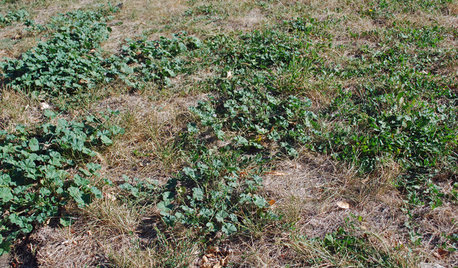


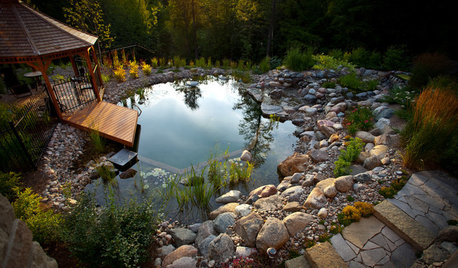



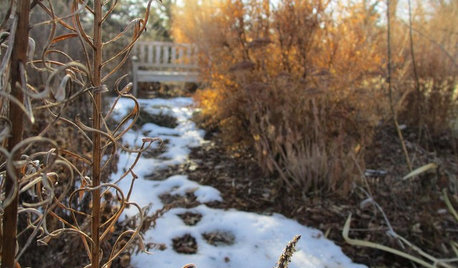
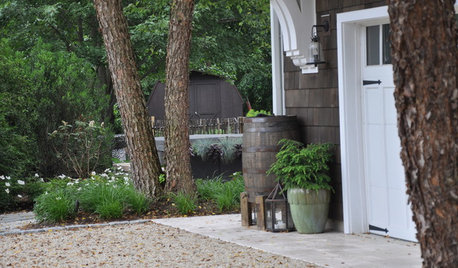








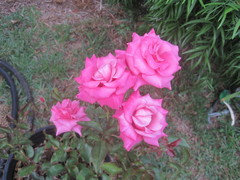
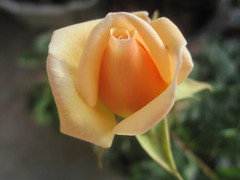
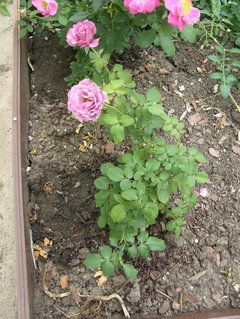










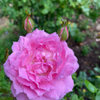
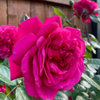
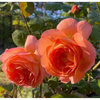
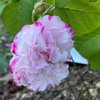
msdorkgirl